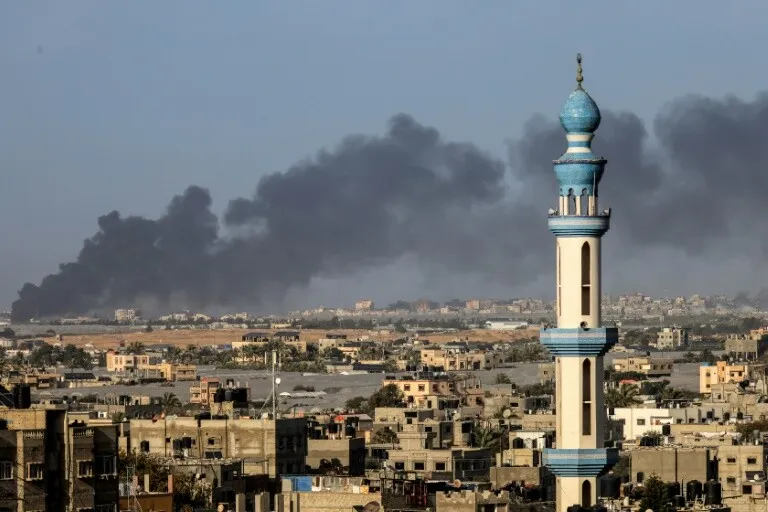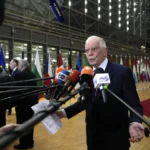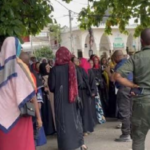Fierce fighting continues on Tuesday between the Israeli army and Palestinian Hamas in Khan Younes, in the south of Gaza, against a backdrop of negotiations to put the war on “pause” for a few weeks, in the absence of a longer-term solution.
Early Tuesday, Palestinian witnesses reported Israeli artillery fire near the Nasser hospital in Khan Younes, the main town in the south of the territory where according to Israel the local Hamas leaders are hiding.
The Palestinian Red Crescent accused the Israeli army of carrying out artillery fire on the fourth floor of its headquarters in Khan Younes, and drones of opening fire, injuring people who had taken refuge in the pregnant with this medical complex.
According to the UN humanitarian aid coordination office (Ocha), “hostilities are intensifying” in this city where the Israeli army claimed on Monday to have taken control of Hamas command posts.
The Palestinian telecoms operator Paltel announced a new cut in internet and mobile communications, a consequence of Israeli military operations in the territory where the situation was already critical for civilians.
The war was triggered by the unprecedented Hamas attack on October 7 on Israeli soil, which resulted in the death of more than 1,140 people, mostly civilians, according to an AFP count based on official Israeli data.
Some 250 people were kidnapped and taken to Gaza, including around a hundred released at the end of November in exchange for Palestinian prisoners. According to the same count, 132 hostages are still in the territory, of whom 28 are believed to have died.
Israel vowed to “annihilate” Hamas, in power in Gaza since 2007, and launched a vast military operation which killed 25,295 Palestinians – the vast majority women, children and adolescents – according to the Ministry of Health of Hamas. The Israeli army has counted 200 deaths in its ranks since the start of its ground offensive.
- Two months of truce? –
Israel offered Hamas, via the mediation of Egypt and Qatar, a two-month pause in fighting and raids in Gaza in exchange for the release of all the hostages, the American site Axios reported Monday evening.
This proposal does not imply the end of the war in Gaza, but a second truce, after that of a week which allowed the release of a hundred hostages in exchange for at least 240 Palestinian prisoners imprisoned in Israel.
Israel’s proposal provides for the return to Israel of living hostages and remains in several phases, the first of which would include women and men aged over 60, according to Axios.
This would be followed by female soldiers, men aged under 60 but not in the military, male Israeli soldiers, then the remains of hostages.
As part of the plan, Israel and Hamas would have to agree in advance on the number of Palestinian prisoners released in exchange for each hostage according to their category, Axios continues.
During a meeting on Monday with members of the hostages’ families, Prime Minister Benjamin Netanyahu spoke of an Israeli “initiative”, while claiming not to be able to “detail” it, according to the local press.
- “Seeds of Hate” –
If the Netanyahu government discusses a truce, it refuses to consider in the longer term the “two-state solution”, an independent Palestinian state alongside Israel, European foreign ministers lamented on Monday.
Meeting in Brussels, the latter met in turn, and separately, their Israeli counterparts Israel Katz and Palestinian Riyad al-Maliki.
Mr. Katz said he was seeking to secure European support for Israel’s war against Hamas and to secure the release of the hostages.
“The (Israeli) minister could have made better use of his time and been concerned about the security of his country and the high number of deaths in Gaza,” reacted the head of European diplomacy Josep Borrell, irritated by the Israeli refusal to discuss the two-state solution.
“What other solutions are they thinking of?” asked Mr. Borrell. “Make all the Palestinians leave? Kill them?” he added. Israelis “are sowing the seeds of hatred for generations to come.”
Beyond the Palestinian Territories, the conflict is exacerbating tensions between Israel and Hamas’s pro-Iran allies, such as Lebanese Hezbollah and the Yemeni Houthis.
In support of Gaza, the latter are increasing attacks on international traffic in the Red Sea and the Gulf of Aden, which is giving headaches to large shipowners and increasing the cost of maritime transport.
But for Mohammed al-Bukhaiti, a senior Houthi official, these strikes “only increase the determination of the Yemeni people to assume their moral and humanitarian responsibilities towards the oppressed of Gaza.”
This article is originally published on notretemps.com








